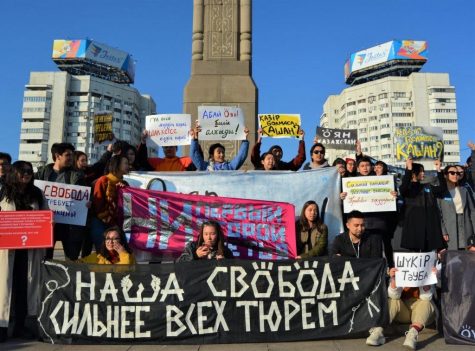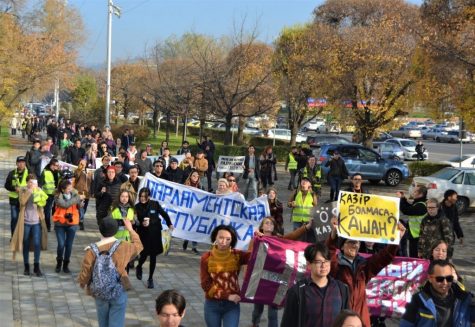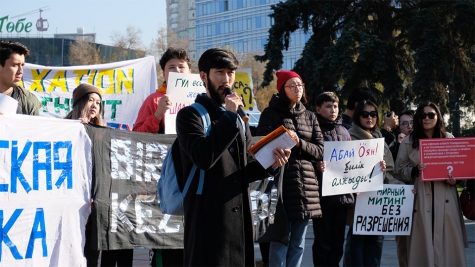Opinion: From my home in Kazakhstan to the US, protesters share similar fight for justice
September 23, 2020

Protests in Chicago and across the U.S. for the Black Lives Matter movement have strangely made me feel homesick.
I emigrated from Kazakhstan two and a half years ago, and despite being located on the other side of the world, Kazakhstan has similar issues surrounding police brutality, although there are key differences.
Over the past few years, peaceful protests for fair elections, freedom of speech, parliament government and basic human rights in Kazakhstan have been met with police brutality and mass arrests.
Today, youth are more politically active than ever, but authoritarian regimes like the one in Kazakhstan tear them down by shoving protesters into police vans, interrogating them for hours or even jailing them for several years. More recently, a simple banner held by activists led to a severe response.
On April 21, 2019, during the city of Almaty’s annual marathon, a group of activists—Oyan, Kazakhstan, or “Wake Up, Kazakhstan”—stood in front of runners with a banner targeted toward the upcoming presidential election that read, “You cannot run from the truth.”
President Nursultan Nazarbayev, who led Kazakhstan for the previous 30 years of its independence and has often been accused of corruption, resigned in 2019. Kazakhstan then held a flash election, which Oyan, Kazakhstan protested, where Kassym-Jomart Tokayev, former Senate of Parliament president, won with 70% of the vote.
I don’t believe this election was fair. When Nazarbayev resigned, I had already moved to the U.S., and for me, the resignation was too sudden—people don’t just leave their position of power after 30 years for no reason.
Nazarbayev still holds a position of power in the country, and I think the election was a way to create an illusion of democracy and change.
According to the U.S. Department of State’s 2019 Country Reports on Human Rights Practices: Kazakhstan: “There were reports the government or its agents committed arbitrary or unlawful killings or beatings that led to deaths. Activists noted that deadly abuse in prisons, particularly abuse carried out by so-called voluntary assistants—prisoners who receive special privileges in exchange for carrying out orders of prison staff—remained frequent.”

One Oyan, Kazakhstan protester who held the sign at the marathon was Asya Tylesova, a civil rights activist, who has been sentenced to nearly two years in prison for knocking off a police officer’s hat.
The entire trial was viewable online, and I witnessed the horror of a live court session where I believe no justice was served.
Along with other Kazakhstan youth, I support this woman because she is not afraid to fight for the good of everyone.
Protesting in Kazakhstan is different from the U.S. because protesters need to ask for permission from the mayor’s office to demonstrate and are then assigned a specific location. The last authorized protest was organized in 2019 by an activist Alnur Ilyashev, who is now facing three years in prison for criticizing the political party Nur Otan on Facebook about their response to the coronavirus and asking Nazarbayev to leave politics in a video.
Darkhan Sharipov, an Oyan, Kazakhstan activist, said the protest authorization system is rife with problems including a lack of control over where people are allowed to gather.
Sharipov said he has applied to protest city issues numerous times, only to be given a pass to protest in the countryside.
“Why do I have to go out of town to share my opinion?” Sharipov said. “I do it in the town to make these problems topical and not to share my opinion in the forest.”

Oyan, Kazakhstan activist Aidana Sultan was at a protest in early March for an activist who died in prison, when police vans showed up to the scene and began shoving people in.
“We hadn’t even managed to go out to any protest,” Sultan said. “As soon as we came to the cafe, police vans showed up … and shoved us in the car without telling us why we are being arrested and where we are going.”
Sharipov and other activists said they were not allowed to access a lawyer and were held longer than the three hours legally allowed in Kazakhstan.
In my experience living in both countries, the U.S. is more progressive in allowing citizens to express and fight for their rights. But both U.S. and Kazakhstan protesters are fighting for their governments to outwardly show they care about their people.
The experiences of these activists are heartbreaking. Ever since I was a little girl, I was told there is nothing I can do about the system in Kazakhstan. I never knew there was an option to fight it, but now I have a voice and hope.
I believe everyone must fight for what they believe in, even if they are fighting an old and seemingly corrupt system.
In a global movement toward freedom and equality, we should all be supporting each other. We might have different cultures and different reasons to protest, but it is the same desire for justice that makes our fights alike.







